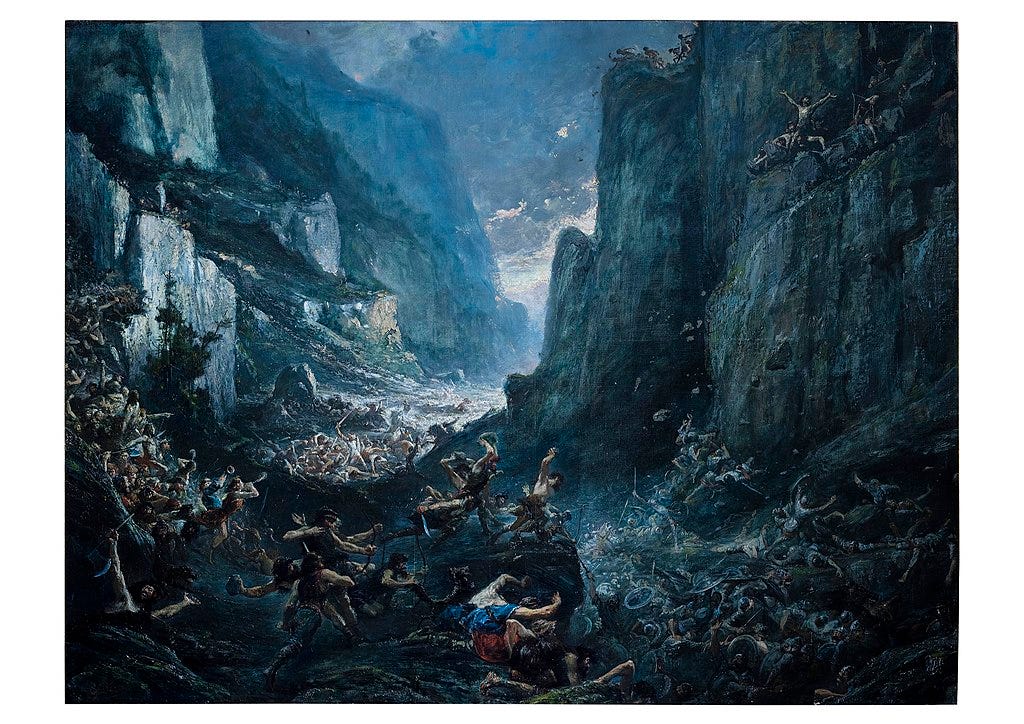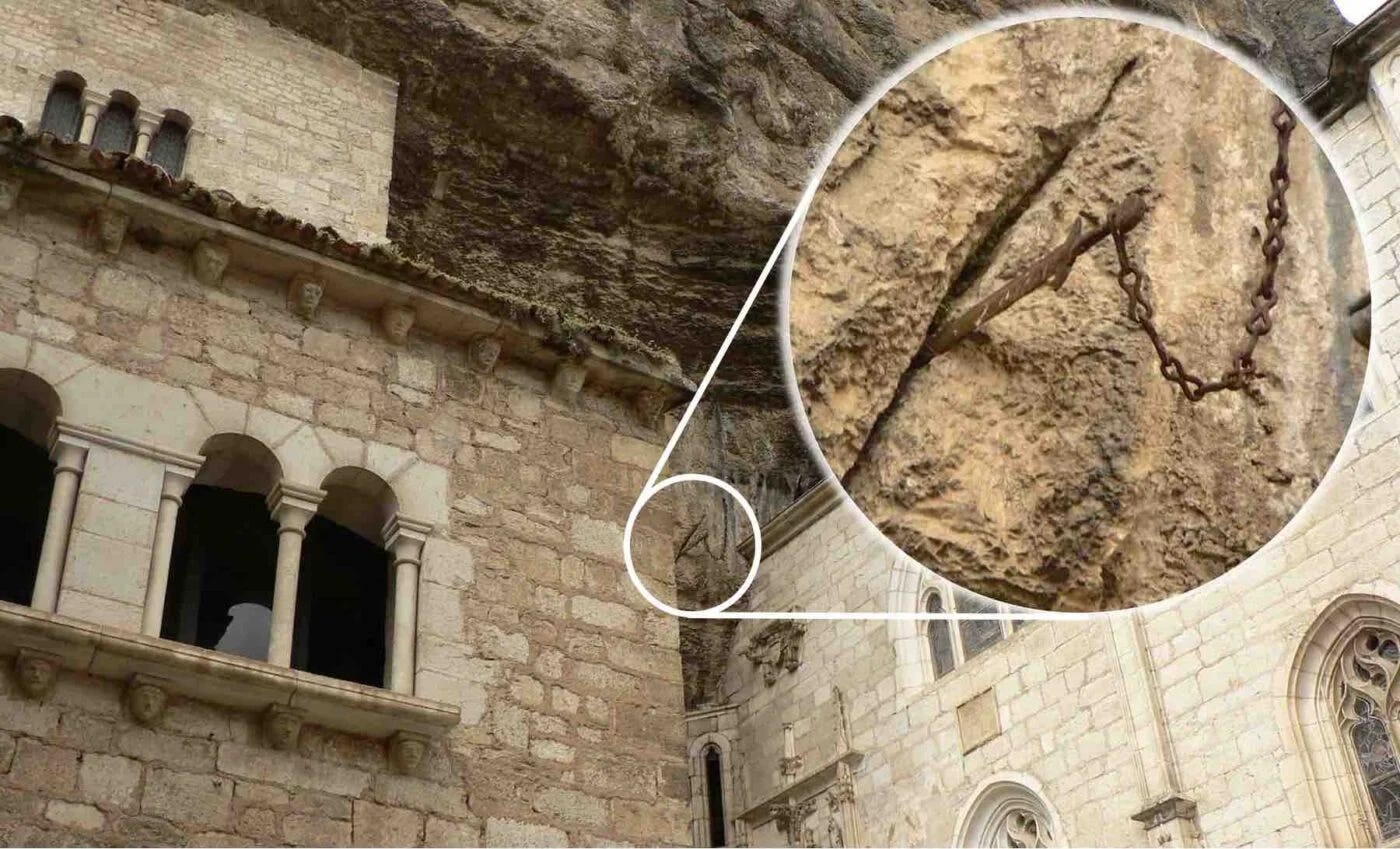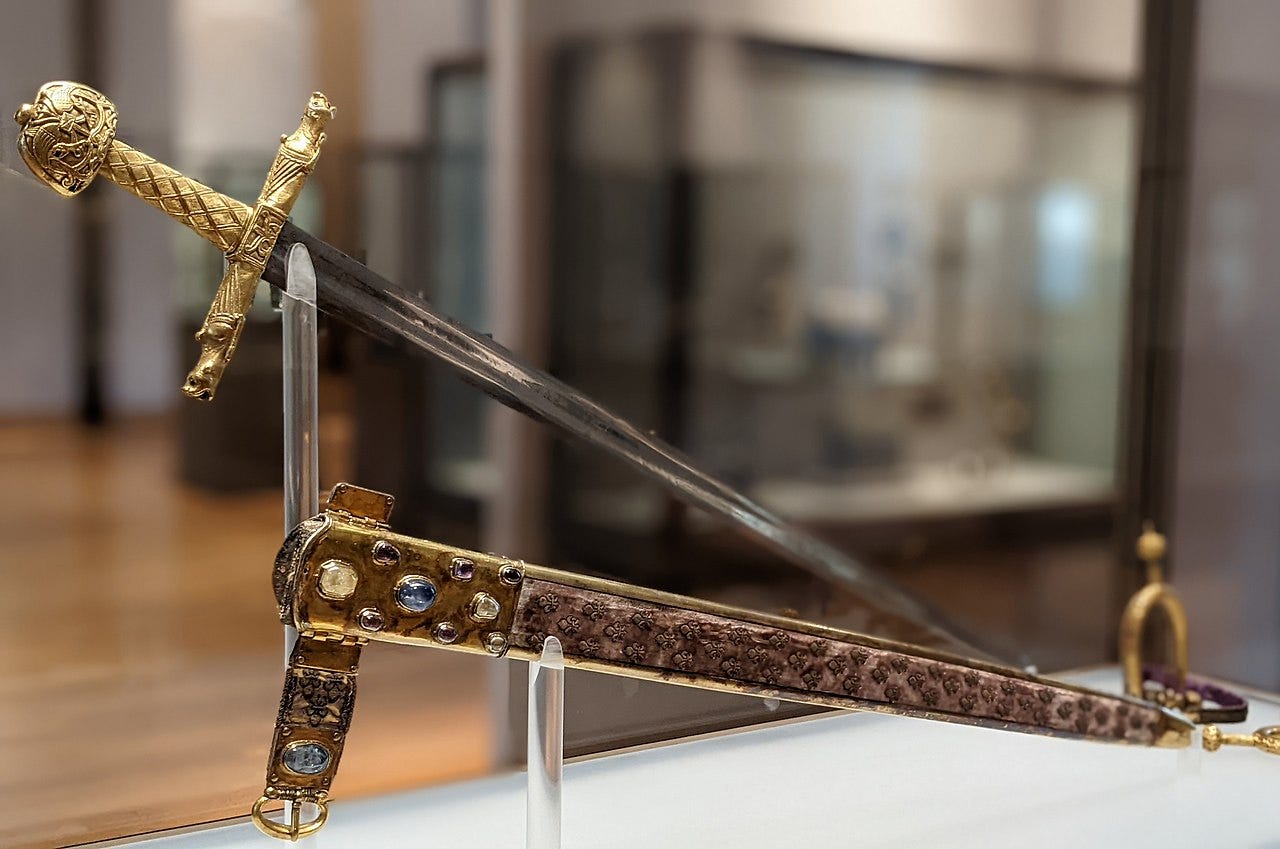Durendal
A magic sword is stolen in southern France. Really.
Marquis Albert, all your hope
is in betraying and in cheating:
towards all those that have truces with you
and serve you eagerly and willingly
you keep neither oath nor faith;
And where I am no Oliver with arms
you are, it seems to me, not quite a Roland's worth…—Raimbaut de Vaquieres, Ara.m digatz, Tenso 4, ca 1200
So, something strange happened last week, while here in the United States we were getting ready for our 4th of July Independence Day holiday. Durendal, the legendary sword of Roland, the hero of La Chanson de Roland, the Song of Roland, went missing.
This will seem like a digression from Richard, but strangely enough the stories connect.
The Song of Roland
What The Iliad and The Odyssey are to Greece, The Song of Roland is to France. La Chanson de Roland is written in Old French (more on that in a minute), and it is a medieval epic poem of 4000 lines, recounting the history of the hero Roland, the nephew of Charlemagne, and the battle of Roncevaux Pass.

Briefly, the poem goes thus: In roughly 780 AD, the emperor Charlemagne goes to Spain to restore the region to Christianity, as it is controlled by Muslims. He succeeds, more or less, then returns from Pamplona, Spain, to France, going through Roncevaux Pass. As they are going through this mountain pass, the Muslims attack them from the rear. Charlemagne decides to leave Roland and fifty thousand men to hold the pass — Roland says, no, twenty thousand men will do — while the rest of them make their escape. It is a suicide mission, not unlike the Spartans at Thermopylae. Roland, like all good epic heroes, has some magic weapons—Durendal, his sword, and Oliphant, a horn made from that of a unicorn. (Oliphant nominally means elephant, but some of the stories have his made from a unicorn). The Muslims attack, and the French are losing. Roland, whether from misguided pride, not wishing to seem a coward, or under the chivalric code, will not blow his horn to call Charlemagne back to save him, even though his right hand man Olivier begs him. Eventually, Roland sees that all of them will die, and he tries to destroy Durendal, so that it will not fall into enemy hands. He tries to break it on a stone, but Durendal cleaves the boulder in half. At last, he hides Durendal under his body, blows Oliphant until his temple explodes, and he dies. Charlemagne does eventually return and take revenge on the forces of Spain. Lots more to the poem, but that’s the relevant part.
Durendal
Durendal is a richly decorated sword, enhanced with religious relics. The hilt is made of gold, and contained within the sword are a tooth of Saint Peter, the blood of Basil, the hair of Saint Denis, and piece of cloth worn by Mary Mother of God.
The name Durendal has many etymologies—most common are “hard strike”, “strong flame”, or “master of stone”. This last is evocative of Roland’s attempt at destruction. While The Song of Roland has the sword hidden under Roland’s body, local legend in France has a different take: as he dies, Roland throws the sword one hundred miles into France, where it sticks in a cleft of rock in the town of Rocamadour.
(Aside: for some time there was a relic of Oliphant at the shrine of Saint-Severinus in Bordeaux, on the Way of St. James pilgrim road leading to Compostela. See this article for more about the relic, and our article on the Pilgrim Routes.)
Joyeuse
Roland received Durendal from Charlemagne, who, according to legend received it from an angel. Charlemagne had his own magic sword, Joyeuse, and so bequeathed Durendal to Roland. The real (as best we can tell) Joyeuse does exist, and is on display in the Louvre.12
The Theft
Sometime during the night of July 3, 2024, Durendal was stolen. The “Durendal” that was wedged in a cleft of rock disappeared. It was thirty feet off the ground, between two medieval towers, and legendarily it had been there for 1300 years, since the time of Charlemagne. There is a lot of winking and nodding when people talk about the sword, but it does not seem that anyone seriously believes the sword that was there is real. Which begs an odd question, why steal it?
One hypothesis, purely my own, is that it is perhaps related to the rise in nationalism in France, as evidenced by recent elections and the rise of various nationalist political parties. The Song of Roland is the national French epic, and Durendal is a symbol of the nation. It is entirely possible that someone sees it as a rallying point. Or, it was drunk college students. Either seems possible. A theft for the intrinsic value of a fake sword seems unlikely.
The authorities do not seem to have any leads.
OK, some real history
The Song of Roland does roughly correspond to historical events. There was a battle in Roncevaux Pass after Charlemagne went into Spain. There was a historical Roland3, and he did die in that battle. Roland’s history comes to us primarily through Einhard’s 9th century Vita Karoli Magni ( The Life of Charlemagne).4
But the battle was between Charlemagne and Basques, not Muslims. The number of troops is wildly exaggerated, possibly by two orders of magnitude, but this is not uncommon for medieval epics. The poem has the Muslim leader describe Charlemagne as two hundred years old and white haired. He was not.
Strangely, The Song of Roland was not written in France, at least as far as we can tell from the surviving manuscript (and there is only one). It was written in England! The manuscript is from the Bodleian museum at Oxford5, and was discovered there in 1835 by a French scholar named Francisque Michel.6 The late discovery of such an important epic brings to mind the late discovery of The History of William Marshal, discovered in the late 1800s. Curiously, it was written in Anglo-Norman French, the French spoken by the rulers of England, not the French of France, nor the Latin of the clerics. (This brings to mind the writing of Ambroise’s History of the Holy War, also written in Anglo-Norman French.) The poem ends with a statement that the tale is told by Thoruldus — he may have been the “author”, but no definitive attribution has been identified. The poem appears to date to between 1120 and 1150, so either during the reign of Steven of Blois, or Henry II, Richard’s father. (Consider this article, which shows a striking correlation between the lands and careers of Charlemagne and Henry II, perhaps indicating the poem was political in nature in support of Henry). Though the events described take place around 780, the poem dates from just after the First Crusade and the matters of Chivalry, Religion, and religious violence are key drivers to the text.
The Intersection with Richard
Somewhere around 1183, Henry the Young King, brother of Richard and son of Henry II, is in open rebellion against his father. He is roaming the south of France, and goes to Rocamadour. History recounts that he sacked the shrine in Rocamadour, and takes Durendal as part of his theft; he needs the money to pay his troops. But shortly after this event, he is stricken with dysentery, and dies shortly thereafter. William Marshal is with him at that time, and it is not hard to imagine the Marshal taking control of the blade. (It may in fact be that this is recounted in The History of William Marshal, but I do not have my copy available at the moment to check). Barber’s biography of Henry II claims that Henry the father replaced the missing sword with his own. So it is not hard to imagine that the Excalibur discovered by Richard might have resided in the treasury together with Durendal for a time. Which leaves the question, how did Durendal get back to France? :)
https://collections.louvre.fr/en/ark:/53355/cl010113394
https://en.wikipedia.org/wiki/Joyeuse
https://en.wikipedia.org/wiki/Roland
https://en.wikipedia.org/wiki/Vita_Karoli_Magni
https://treasures.bodleian.ox.ac.uk/treasures/chanson-de-roland/
https://www.journals.uchicago.edu/doi/abs/10.2307/2903705?journalCode=spc




